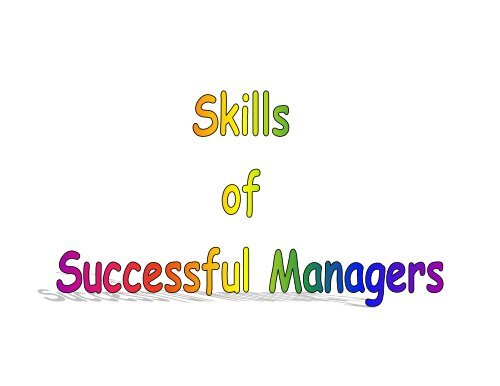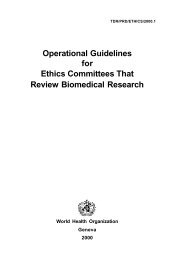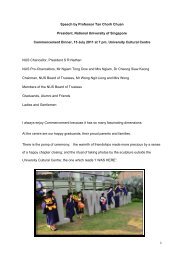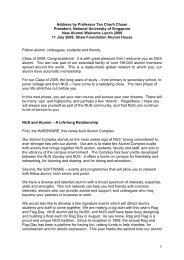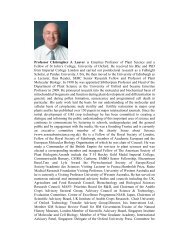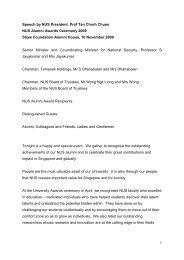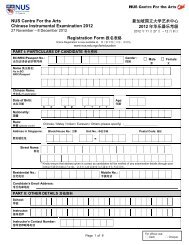Skills of Successful Managers
Skills of Successful Managers
Skills of Successful Managers
Create successful ePaper yourself
Turn your PDF publications into a flip-book with our unique Google optimized e-Paper software.
THE CHANGING ROLE OF<br />
MANAGEMENT
TODAY’S BUSINESS<br />
ENVIRONMENT<br />
• Global competition – More pressure to perform<br />
• Increase in customer’s expectations (internal & external)<br />
• Pace - Doing more with less resources and faster<br />
Increased workload – Increased work hours<br />
• Frequency and speed <strong>of</strong> changes – Business scope,<br />
organisational structure, technology,…<br />
• Pressure to learn and improve, upgrade, develop<br />
• Always rushing – Never catching up - High stress levels<br />
• Lack <strong>of</strong> work-life balance
THE CHANGING ROLE OF<br />
MANAGEMENT<br />
The interpersonal skills and emotional competencies that<br />
facilitate a productive workplace are <strong>of</strong> utmost<br />
importance.<br />
<strong>Managers</strong> have to understand their own emotional makeup<br />
as well as that <strong>of</strong> others in the workplace, and they<br />
have to be able to manage relationships and build<br />
networks.<br />
Adpated from Perry Zeus & Susanne Skiffington “Coaching at Work”
Total EQ<br />
IntRApersonel EQ<br />
IntERpersonel EQ<br />
Adaptability<br />
Stress Management<br />
General Mood<br />
Source: MHS<br />
Senior <strong>Managers</strong><br />
85 90 95 100 105 110 115<br />
Needs improvement<br />
Effective functioning<br />
EQ<br />
<strong>Successful</strong><br />
Unsuccessful
General Mood<br />
This scale refers to our overall feeling <strong>of</strong><br />
contentment and satisfaction with life, and<br />
our overall outlook.<br />
People with good skills in this area are<br />
generally happy and positive people and<br />
are able to overcome adversity and deal<br />
with setbacks effectively!<br />
“Success is how high you bounce when you hit bottom.”<br />
- General George Patton<br />
"Fall seven times, stand up eight."<br />
- Japanese Proverb
Source: Harvard Business Review – April 2000
“Executive’s emotional intelligence –<br />
their self-awareness, empathy,<br />
rapport with others – has clear links<br />
to their own performance.<br />
But new research shows that a<br />
leader’s emotional style also drives<br />
everyone else’s moods and<br />
behaviours – through a<br />
neurological process called ‘mood<br />
contagious’. It’s akin to “Smile and<br />
the whole world smiles with you”.
Emotions travels through an organisation like<br />
electricity over telephone wires. Depressed,<br />
ruthless bosses create toxic organizations filled<br />
with negative underachievers. But if you’re an<br />
upbeat, inspirational leader, you cultivate<br />
positive employees who embrace and surmount<br />
even the toughest challenges.<br />
This isn’t just about putting on a game face every<br />
day. It means understanding your impact on<br />
others – then adjusting your style accordingly”.<br />
From “Primal Leadership: The Hidden Driver <strong>of</strong> Great Performance”, HBR-Article by Daniel Goleman, Richard Boyatzis,<br />
and Annie McKee, 2001
Optimism<br />
The ability to<br />
look at the<br />
brighter side <strong>of</strong><br />
life and to<br />
maintain a<br />
positive<br />
attitude, even in<br />
the face <strong>of</strong><br />
adversity
The ability to<br />
feel satisfied<br />
with one’s life,<br />
Happiness<br />
to enjoy oneself<br />
and others, and<br />
to have fun
“Your foremost job as a leader is to take<br />
charge <strong>of</strong> your own energy and then to<br />
help orchestrate the energy <strong>of</strong> those<br />
around you.”<br />
Peter Drucker
Latin “spirare” = to breathe, to give life<br />
Cambridge Dictionary “to fill someone with<br />
confidence and eagerness, esp. so that they<br />
feel they can achieve something difficult or<br />
special”
The Three Types <strong>of</strong> Employees<br />
1 Engaged employees work with<br />
passion, feel connected to their company,<br />
drive innovation and move the company<br />
forward<br />
2 Not Engaged employees are<br />
essentially “checked out”, sleepwalking<br />
through their workday, putting time, not<br />
energy or passion into their work<br />
3 Actively Disengaged employees<br />
are busy acting out their unhappiness and<br />
undermine what their engaged co-workers<br />
accomplish
LISTEN<br />
with<br />
EMPATHY
When someone comes to you with<br />
negative feedback, what is the first thing<br />
you think to yourself?
1. Here we go again. Another annoying<br />
complainer. This is a waste <strong>of</strong> my time.<br />
2. I'm going to sit here and pretend to listen to this<br />
and then give them the facts on their latest<br />
performance measures.<br />
3. Why can't he/she pay attention to the really<br />
important issues, like getting this project<br />
completed on time?<br />
4. Why is this an issue? I need to get more<br />
information.<br />
5. What is this person really saying here? Or,<br />
rather, what is not being said and maybe needs<br />
to be addressed?
You cannot have empathy without asking<br />
questions. Some typical ones are:<br />
"Can you say more about that?“<br />
“Really? That's interesting. Can you be more<br />
specific?“<br />
"I wasn't aware <strong>of</strong> that. Tell me more.“<br />
"I'm curious about that…let's discuss this in more<br />
depth.“<br />
"Let me see if I understand you correctly…here is<br />
what I hear you say…"
?<br />
POWERFUL<br />
QUESTIONS<br />
?<br />
?<br />
?
Normal questions:<br />
POWERFUL QUESTIONS<br />
- Problem or detail focus<br />
-‘Why’<br />
- Person questioning<br />
analyses<br />
-Outcomes produce reasons<br />
Powerful questions:<br />
-Solutions focus<br />
-‘How to’<br />
- Person being questioned<br />
uncovers answers<br />
-Outcomes produce actions
COMMUNICATING<br />
LIKE<br />
A SUCCESSFUL<br />
MANAGER
POSITIVE COMMUNICATION<br />
No<br />
Criticising<br />
Condemning<br />
Complaining<br />
Am I Contaminating or Contributing?
And…<br />
Select good people<br />
Define clear expectations<br />
Praise and recognition
65% <strong>of</strong> Americans reported not having<br />
received any recognition in the<br />
workplace the previous year<br />
46% <strong>of</strong> people leave their jobs because<br />
they don’t feel appreciated<br />
US Department <strong>of</strong> Labour
I can live for<br />
two months on<br />
a good compliment.<br />
(Mark Twain)
No leader can ever make a<br />
mistake by giving compliments<br />
on what his co-workers have<br />
achieved.
Select good people<br />
Define clear expectations<br />
Praise and recognition<br />
Show care – research confirms a link<br />
between caring and productivity
Know your employees<br />
For Example:<br />
Strengths + Weaknesses<br />
How they prefer to communicate<br />
How they like to receive praise<br />
Their triggers<br />
Personal details
OR<br />
?
Minimum 3:1<br />
Ideal 5:1<br />
Ineffective 13:1
Times Magazine – January 2005<br />
• Count Your Blessings<br />
• Acts <strong>of</strong> Kindness<br />
• Engage with your Work<br />
Mihaly Csikszentmihaly
People will forget what you said.<br />
People will forget what you did.<br />
But people will never forget<br />
how you made them feel.


